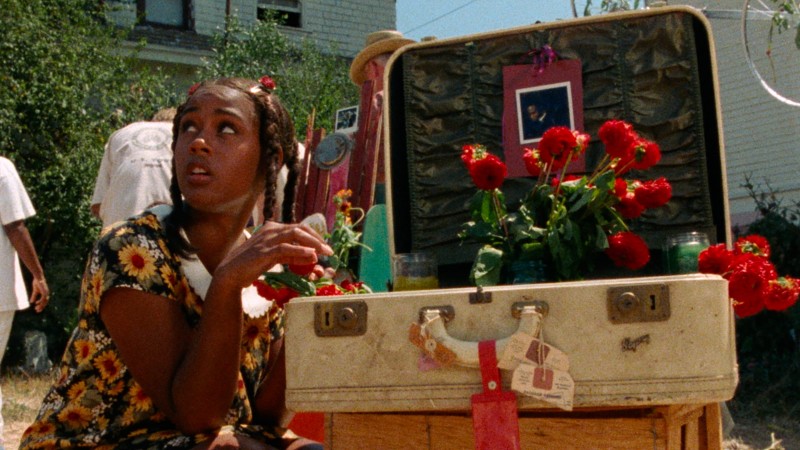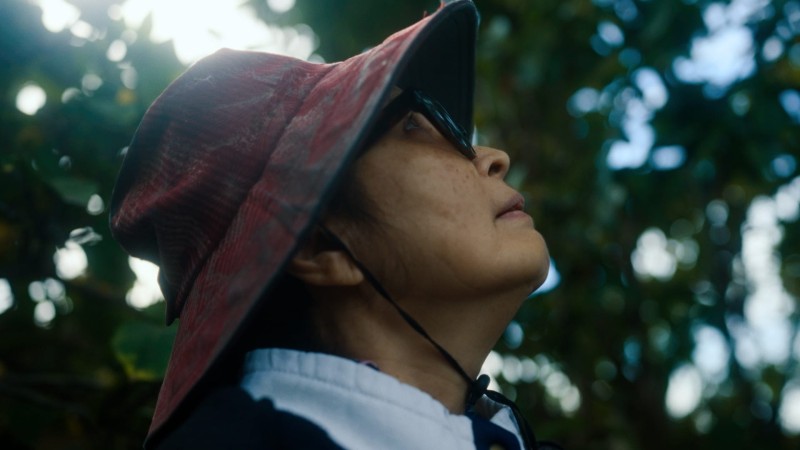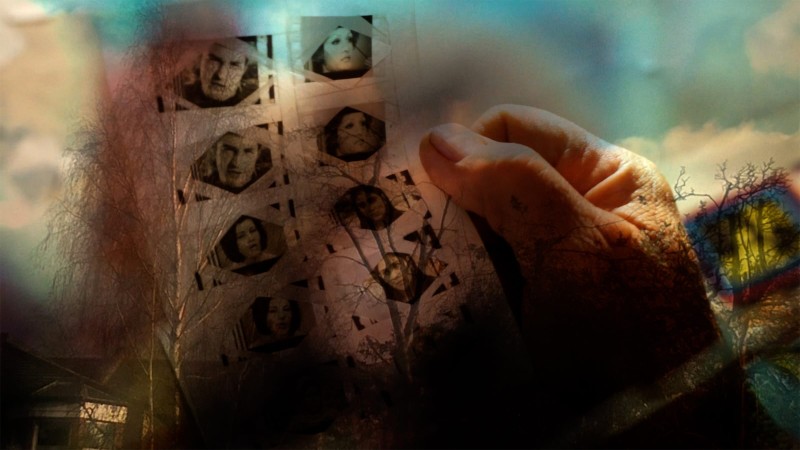
I stumbled onto Will Niava’s debut short film, Zoo, via a still I saw online: a close-up of a young man’s face under blue neon, framed by cigarette smoke. Curious about this striking image, I tracked down the film and was immediately pulled into its unsettlingly immersive story, precise and dynamic camera movements, and skillfully designed soundscape. Zoo follows an evening in the life of Amos (Amos Nzamba), an emotionally detached young man living in the suburbs of Montreal. He spends his days hanging out with his friends Slim (Brendan Sheehan) and Santos (Ian Contreras) but doesn’t think much of them. One evening in the parking lot of a convenience store, a misunderstanding between Amos and a troubled man (Ian Cloutier) quickly escalates into a full-blown confrontation. Niava, who contributed to every aspect of production, assembled a talented group of collaborators who helped bring his vision to life. The film, which is featured alongside Michael Haneke’s Code Unknown on the Criterion Channel, is a haunting reflection on alienation, authority, and the power of words. Ahead of its Channel premiere, I chatted with Niava about his approach to filmmaking, the widespread and persistent problem of police brutality, and the role that independent cinema has in shedding light on social issues.
You moved from Ghana to Canada ten years ago to study film production. What was behind that decision?
I was planning on going to film school in Ghana, but when I visited the school and showed them my videos, they told me not to waste my money. Students in their last year told me to go elsewhere. That’s when my parents realized that I might be good! When I arrived in Canada in 2010, the first thing I wanted to know was which filmmakers were from here, specifically from Montreal. I discovered Denis Villeneuve the year I arrived, and he became one of my favorite filmmakers. He and Xavier Dolan were major influences early on. Then there are also the all-American greats like Paul Thomas Anderson and Spike Lee. PTA is one of the reasons I decided to make films. I saw There Will Be Blood and I had never seen anything like it. I thought, wow, we need to do something like that in Ghana!
What is the independent film scene like in Montreal?
Every Montreal film feels like an independent production. Every single thing that’s happening here right now has a super eclectic, super vibrant vibe. Filmmakers like Jeremy Comte are coming out with bomb films. He was a major inspiration in school and working with him opened up a whole new world for me. I worked on Fauve, his short film [available on the Criterion Channel]. Jeremy was involved in every step of production. He found locations on Google Maps and lived the whole experience alongside the actors, who were kids. He would shoot them on his phone, and he rewrote the script a few times so that it fit them. That’s also how I make my films: I have to live the experience.
Also, it seems that the Montreal independent film scene helps shed light on subjects that are usually pushed to the side, especially here. Only now, with the Black Lives Matter movement, are we talking about systemic racism, and the government is still denying it exists! I think that films like Zoo help shed light on important issues. The response has been great. Random people have reached out to me and told me they were so moved by it that they now wanted to talk about racism with their friends and family. I think that’s what the indie scene is doing, pushing subjects that need to be spoken about to the forefront. That’s where I see myself thriving as a filmmaker, which is not to say that that’s the only thing I want to do.
Tell me about how you originally conceived Zoo and how it evolved.
I had always wanted to make a film about my experience with cops or with authority in general. I’ve had incidents here, in Ivory Coast, and in Ghana. Once, in Ghana, my friends and I were wrongfully arrested and taken to jail. One of my friends is half white, and when the cops see that, they know that they can take advantage of the situation to demand money. They planted a joint on us. We understood what was going on, but my friend got angry. I tried to calm the situation, but it escalated, and they took us to the station. We were stripped down to our underwear and put in a cell with ten other guys who were in the same situation. They undress you because they want you to feel like you’re nothing. That experience really juiced me up. In the moment, I was panicking. I felt like my life was over and I was never going back to the things I loved. It was a wild experience, and I needed to bring that kind of feeling to the screen.
Then, with everything happening in the States these last years, I wanted to talk about abuse of power from a Montreal point of view. These things happen in Canada, but they’re always hushed. You’ll never see anything on the news. You’ll only find out if someone happens to capture an incident on their phone or from your barbershop. My barbershop’s where I hear all the stories about people being harassed by cops or the metro police.
In early 2019 I was contacted by Anthony Galati, who would become one of the producers on Zoo. He comes from an electronic music background and he wanted to get in touch about a music video idea he had for his project Solitary Dancer. We met for the first time at a bar in Montreal, and he pitched a video idea that was a commentary on police brutality. We were really on the same page. He was deeply upset about what was happening in the world and was also inspired by similar videos by artists such as Yves Tumor and their exploration of police violence. Anthony wanted to partner up to try and tell that type of story as a kind of “extended music video,” but I also wanted to shoot something bigger. I wanted to do a short film, and I was so obsessed by this idea that I wrote the script for it quickly. Between Anthony, his partner Adam Hodgins, and me, we only had the money to make a music video, but my friend Alleck Doxer was starting a production company and I pitched Zoo to him. He put another $10,000 of his own money into the film. It was crazy, like a miracle. We ended up shooting the music video as a short film, which Anthony and Adam then scored. So that’s where it all stems from. The hunger for making this film came from my own experiences, and this opportunity just came along so perfectly.
How did you work with your DP, Simran Dewan, to establish the look of your film?
I had never worked with Simran before, but I looked up to him in film school. He was always working on some really good stuff. I wanted to collaborate with someone who didn’t feel too far away from me and who could meet me at my level—someone who would respect and help me develop the project. Simran was kind and attentive to what I had to say, but he also had a lot of ideas. I always welcome that! We’d try his ideas and mine—we combined them.
Early on, I went to Simran’s house to get a vibe and talk about the movie. He related to the story and we had a lot of the same influences. The main one was La Haine. We wanted our film to have the same overall energy. At first, we considered shooting in black and white, to pay homage to La Haine, but we decided not to because we really wanted to distinguish Zoo as its own thing. Simran worked closely with Harley Francis, our gaffer. They have a special bond. Harley has a crazy eye for light, and he’s the reason that Zoo looks the way it does. We didn’t use much lighting, just some tube lights at key moments. Simran and Harley really brought the film to life.
What was the process of casting like?
I was looking specifically for people of different races. I needed a Latino guy for this group to work. I wanted it to look like what Montreal looks like right now: super Latinx, super Black. Except for the troubled man I found on Facebook, none of the actors had acted before. The casting was done guerilla-style. It was very random.
Amos is the only one I knew before. He had done some fashion work and he was comfortable with the camera. He’s a great-looking guy, and I wanted to use his calm force to portray something strong. He has this huge power in his eyes and in his calmness. He doesn’t need to speak to be understood. I always felt that Amos needed to be on the silver screen, and he was perfect for Zoo. I saw Slim, the white guy in the group, in a convenience store. I had just finished the script. He came into the store and was wearing all white with bright pink hair. I kept looking at him and I knew he was Slim. He caught me staring and I gave him my number. Later, we met up in a Montreal alleyway and I pitched him the movie. I had been following the guy who plays Santos online for a few years. He was a random Latino kid I found so dope-looking. I admired his style and his music. I felt like he looked like the future. Like he was tapped into something. So I hit him up and presented the project. He was so flakey! Just like the character . . . Santos is not supposed to care. I pursued him until I made him believe in Zoo, and all of a sudden I had all of my characters right there in front of me. That’s when it felt like it was actually happening.
None of them knew each other before, but when you put these guys together it sparks something. You felt like they had always known each other. It’s because of how I cast. I’m not casting for someone to feel like they have to work hard to become the character. They have to be the character. I molded the script around these guys. I didn’t want them to act as much as I wanted to capture them being themselves.

We experience the film through Amos’s eyes, but he doesn’t actually speak very much. When and why did you decide to use voice-over to convey Amos’s point of view?
Amos’s story is that he’s not from this place and he was almost forced to be in this situation. As comfortable as he feels with these people, he wants more out of life. When you’re not doing the things you want to do, you don’t talk much. Amos doesn’t want to entertain his friends, but they’re entertained just by his presence. He represents the voice of Black people—we’re often silenced. He’s not saying out loud the things he tells himself. He’s not speaking up or protesting, and that’s his flaw. He’s not acting, and day after day he tells himself that this is the last time he’s going to hang out with these guys and that he doesn’t know what he’s doing. He feels stuck and powerless to the point where he realizes he could die having done nothing with his own mind. During the confrontation, Slim and Santos try to defend him because they know he doesn’t usually speak much, but Amos is trying to calmly de-escalate the situation. He’s speaking, but isn’t heard. That happens a lot—people try and step in when, really, they should listen. In the beginning, we hear his internal monologue, we get a little into his head, but I didn’t want it to be a recurring thing. I wanted the audience to have a basis for where he’s coming from but to be left to imagine what he’s thinking the rest of the time.
Footage of the brutal arrest of a Black man plays alongside the end credits. Can you tell me about your decision to include this material in the film?
I had finished editing Zoo and was showing it around for feedback when I stumbled on the footage. I was looking at dates and realized what was shown in it happened a few weeks after we wrapped. It was so disturbing to see this cop treat the human body as if it were a toy. The cops pulled up next to a kid who was walking down the street because they had received a call about a suspicious person, and he matched the description. The only information they had was “a Black man of a certain height.” I met the guy who shot the footage and he told me it was so savage. The boy was so quiet the whole time. He wasn’t protesting, not doing anything. His head could have smashed so easily, and when I saw that I thought of our movie. You can tell it’s in Montreal because you hear the cops’ accents. People usually don’t think that kind of stuff happens here, but it’s an everyday thing. At the end of Zoo, the screen goes dark and there’s a ten-second silence to let the audience digest. That’s when you hear a lot of breathing from the audience. They’re thinking, “What was that? What did I just watch?” and I wanted to follow that up with the footage because it was important for me to remind people that it is real life.
The film’s missing elements force the viewer to make assumptions. We don’t know why the agitated white man is on edge or if he’s a cop. At what stage of production did you decide that his character should be ambiguous?
That happened in the editing. I had a whole backstory for him. His son had broken out of rehab and his ex-wife was calling him to complain and tell him their son’s an alcoholic and making the same mistakes he did. I had an actress playing the voice on the phone. It turned into the most stressful scene, and sometimes when you’re breaking your head to make something work, you actually have to look at the simpler way of doing things. It was a hard cut, deleting his whole backstory, and what we really needed was a man who was going through something extremely stressful, which everyone can relate to. Something any of us could feel in our day-to-day. In this case, the specifics don’t matter because whatever those issues are, they ultimately don’t justify his actions. What he does is horrible no matter what.
Can you tell me a little bit about the projects you’re working on now?
I just finished directing my first commercial job, a TV series for MTV in Ivory Coast. During the shoot, I was itching to do something that felt more like me. Latigone N’Goma, who was a production manager on the series, encouraged me to do a couple of music videos for an artist called BUMER after we wrapped. Over three days, we shot a story of five slum boys who want more out of life than to work tirelessly in the hot markets of Abidjan. Latigone and I conjured up a compelling story out of nothing and with my amazing DP, Harley Francis, we brought this poetic journey to life. Ultimately, I’m going to cut three music videos and a short film from the footage we shot. ELEMENT will be the first film I shoot in my motherland. I’m also excited to have cowritten Jeremy Comte’s first feature-length film. It’s my biggest project of 2021. PARADISE is the coming-of-age story of two boys—one in Ghana and one in Quebec. I can’t tell you any more than that for now. God willing, in a few months, we’re going to start preproduction in Ghana, and the adventure continues! Until then, there’s still a lot to come.
More: Interviews

First and Foremost: Rógan Graham on Black Debutantes
The critic and curator talks about working on a program of films by trailblazing Black women directors, which opened at London’s BFI Southbank this year and is now playing on the Criterion Channel.

The Other Side of Apocalypse: A Conversation on We Were the Scenery
In this Sundance-award-winning exploration of war and memory, writer Cathy Linh Che shines a spotlight on her parents, who were Vietnamese refugees living in the Philippines when they were cast as extras in Apocalypse Now.

The Banality of Apartheid: A Conversation with Milisuthando Bongela
In her intensely personal debut feature, the filmmaker and poet investigates the myths that have shaped South African history through a mix of archival footage, poetic remembrances, and conversations with friends and family.

“A Fragile Film Utopia”: Talking with Ehsan Khoshbakht
The director of the documentary Celluloid Underground discusses his life as a curator, Iranian film culture, and the inherent ephemerality of cinema.